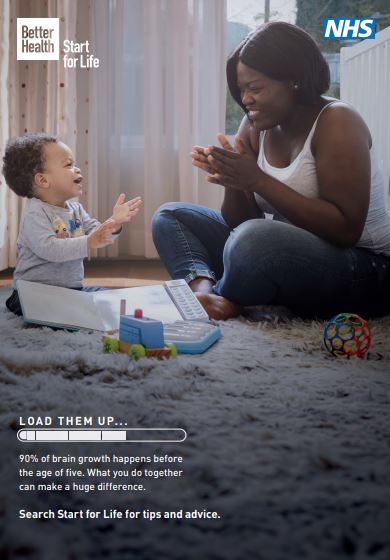The more we chat, play and read with our kids, the more we help build their brains. Any time, anywhere, whether at home or out and about, it all adds up. There’s no need to buy lots of toys or have big days out. Wherever you are, simply chatting back and forth, answering your child’s questions and sharing special moments together all help their brain to grow and develop secure and strong connections. Just what they need to get off to the right start at school.
The Start for Life website is packed with simple ideas from other parents on how to build these little moments into each day. It includes lots of examples of tips and activities for you to do together with your child at different ages, as well as links to find further support in your local area.
Visit the Start for Life online hub for other simple tips and activities, or visit the Lewisham Family Hub webpage where you can find out more information.
Interacting with your child:
• Get on the same level as your child, on the floor playing .
• Follow the child’s lead and interests, is it cars, balls or teddies?
• Pause and wait for your child to show what they’re interested in, do they prefer sorting toys, or rolling a ball?
• Listen, watch, and respond to all forms of their communication, are they babbling, laughing or pointing?
• Describe the child’s actions and consider what their thoughts and feelings might be, “you’re having fun with the water”.
• Share enjoyment through your voice and body language, by clapping, encouraging and laughing with your child.
• Copy or fill in whenever the child attempts to communicate, “Is it the BALL that you want?”.
• Use few questions, describing what’s happening instead “The ball is bouncing isn’t it?”
• When asking questions, try to keep them open-ended “what shall we play with now?”
Ideal places and times for ‘Together Time’:
• Bath time “Lets squish the bubbles, lets pour some water”
• Mealtimes “The potato is crunchy, the carrots are orange”
• Outdoor time “What colour are the flowers?”, “Can you hear the birds, I wonder what they’re saying?”
• Bedtime routines “Let’s go and clean our teeth”
• Shopping trips “Can you find me an apple?”, “The wheels on the trolley go round and round”
• Book-sharing moments “What is the elephant doing?”
• Toddler group interactions “Let’s go and see what Tommy is playing with”
• Playtime with toys “Let’s play”
• Any daily routines shared together, “Let’s put the toys away”
• Whilst on public transport – “How many red cars can we see?”
Early Learning and Development
90% of your child’s brain growth happens before the age of 5. Right from the start, all those little moments you spend together with your child are building their brain.
Every smile, cuddle, chat and game makes a huge difference, helping them learn to communicate, develop confidence and make friends.
Find lots of ideas, easy tips and activities you can do together with your child.
- Learning to talk 0-6 months
- Learning to talk 6-12 months
- Learning to talk 1-2 years
- Learning to talk and communicate 2-3 years
- Learning to talk and communicate 3-5 years
Research shows that becoming a parent presents an opportunity to provide information to support behaviour change, and that when looking for information and advice people want validated sources of authority, such as the NHS. This puts the Start for Life Email Programme in a unique position within a very crowded market of pregnancy and parenting advice.
The Start for Life Email Programme is a universal offering, for all parents-to-be and parents of children up to four and a half years old. The service provides regular emails to the audience as their child reaches key milestones.
The Start for Life Email Programme has a particular focus on those from less socioeconomically privileged backgrounds, as we know that they are much less likely to be searching for and accessing reliable information on pregnancy and parenting. Healthcare professionals are also a target audience as they are a key channel for driving people to Start for Life services.
The email programme can be translated in to dozens of different languages, provides personalised messaging that is time sensitive and served to parents and carers as and when they need it, according to their parenting/caring journey. Encourage parents and carers to sign up now.
Additional resources
BBC Tiny Happy People is a BBC service for the parents and carers of the youngest learners. The one minute, one message films offer tips and activities for language learning through play, plus films that show babies’ brains development and why parents are so important to that development
Book Trust
Reading tips, activities, story-time videos, book recommendations and more
National Literacy Trust
Milestones, tips, resources and advice for parents to support their child’s literacy development
Institute of Wellbeing
Advice to support literacy development and wellbeing kits to help parents take care of their family and their mind
Speech and Language UK
Support for parents who are worried about their child’s language development
Early Years Alliance
Practical tips for parents to support their child to learn through play



